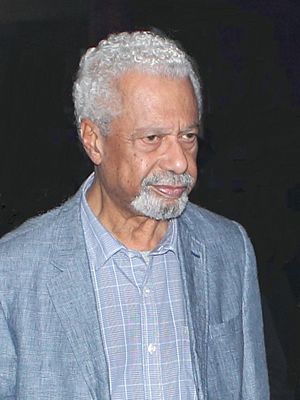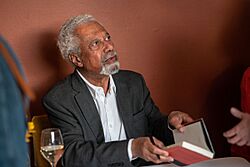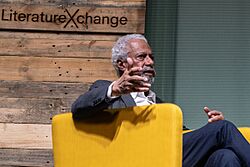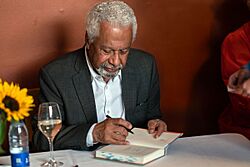Abdulrazak Gurnah facts for kids
Quick facts for kids
Abdulrazak Gurnah
FRSL
|
|
|---|---|

Gurnah in January 2023
|
|
| Born | 20 December 1948 Sultanate of Zanzibar |
| Occupation | Novelist, professor |
| Language | English |
| Education | Canterbury Christ Church University (BA) University of Kent (MA, PhD) |
| Notable works |
|
| Notable awards | Nobel Prize in Literature (2021) |
Abdulrazak Gurnah (born December 20, 1948) is a famous novelist and professor. He was born in Zanzibar, an island that is now part of Tanzania. In the 1960s, he moved to the United Kingdom as a refugee. This happened during a time of big changes in Zanzibar.
Gurnah has written many important novels. Some of his well-known books include Paradise (1994), By the Sea (2001), and Desertion (2005). These books have won or been nominated for major awards.
In 2021, Abdulrazak Gurnah received the 2021 Nobel Prize in Literature. He won this award for his powerful stories about how colonialism affects people. His books also explore the experiences of refugees who are caught between different cultures and places. He is now a retired professor of English at the University of Kent.
Contents
About Abdulrazak Gurnah
His Early Life and Schooling
Abdulrazak Gurnah was born on December 20, 1948, in Zanzibar. When he was 18, he left the island. This was after a big change in government there. He arrived in England in 1968, seeking safety as a refugee.
His family has Arab roots. His father and uncle were businessmen who had moved from Yemen. Gurnah has shared that when he came to England, the idea of being a "refugee" was different. He noted that today, more people are fleeing from dangerous places.
He first studied at Christ Church College in Canterbury. Later, he went to the University of Kent. There, he earned his PhD in 1982. His PhD focused on how West African fiction is reviewed.
His Career as a Professor
From 1980 to 1983, Gurnah taught at Bayero University in Nigeria. After that, he became a professor at the University of Kent. He taught English and literature that explores the effects of colonialism. He taught there until he retired in 2017. As of 2021, he is still a professor emeritus at the university. This means he is a retired professor who keeps his title.
His Journey as a Writer
Besides teaching, Gurnah is a talented writer. He has written many short stories, essays, and novels. He started writing in his 20s because he missed his home. He began by writing in a diary. These thoughts grew into longer reflections about his homeland. Eventually, he started writing fictional stories about other people.
This helped him use writing to understand his experiences as a refugee. He wrote about living in a new country and feeling displaced. These early stories became his first novel, Memory of Departure (1987). He wrote this book while also working on his PhD. This first book set the stage for his later works. His books often explore the lasting effects of colonialism, war, and being forced to move.
Even though critics liked Gurnah's novels, they were not always big sellers. Some were not even published outside the UK. But after he won the Nobel Prize in Literature in 2021, many people wanted to read his books. Publishers and bookstores worked hard to meet the demand. It was only after the Nobel announcement that American publishers became very interested in his novel Afterlives. They also re-released some of his older books like By the Sea and Desertion.
Gurnah's first language is Swahili. However, he writes his books in English. He often includes words from Swahili, Arabic, and German in his writing. He has said that he had to convince publishers to let him do this. They often wanted to change or italicize these "foreign" words. Gurnah believes that publishers should not make "alien" words seem strange.
Literary experts note that Gurnah's writing has made English literature richer. His stories show how people from Asia and Africa have added to the language.
What Gurnah's Stories Are About
Gurnah's writing often explores similar ideas. These include being in exile, feeling displaced, and searching for a sense of belonging. He also writes about colonialism and broken promises by governments. Most of his novels tell stories about people in developing countries. These characters are often affected by war or crises. They might not be able to tell their own stories.
Many of Gurnah's novels are set on the coast of East Africa. Many of his main characters were born in Zanzibar. Gurnah has not lived in Tanzania since he left at 18. However, he says his homeland always influences his imagination. This happens even when he tries to set his stories in other places.
A literary critic named Bruce King says that Gurnah's novels show East African characters in a global setting. He notes that in Gurnah's stories, Africans have always been part of a bigger, changing world. King also says that Gurnah's characters are often uprooted and feel unwanted. They might feel like victims.
Another critic, Felicity Hand, points out that Gurnah's novels Admiring Silence (1996), By the Sea (2001), and Desertion (2005) all deal with the loneliness that comes with moving away. They also explore questions about identity and what "home" truly means. She observes that Gurnah's characters often do not find success abroad. They use humor and irony to deal with their situations.
Novelist Maaza Mengiste has described Gurnah's works as "unflinching" yet "compassionate." She says he writes quiet stories about people from East Africa who are often not heard. But his writing insists that we listen to them.
An academic named Dr. Ida Hadjivayanis is translating Gurnah's novels into Swahili. She hopes that his work will be read more in East Africa. She believes that including books like Paradise and Afterlives in school lessons would make a big difference.
Other Writings and Activities
Gurnah has also edited books of essays on African writing. He has published articles about other modern writers. He was the editor of A Companion to Salman Rushdie. Since 1987, Gurnah has been an editor for the magazine Wasafiri.
He has also been a judge for several literary awards. These include the Caine Prize for African Writing and the Booker Prize. He supports a boycott of Israeli cultural groups. He was one of the first people to sign a statement called "Refusing Complicity in Israel's Literary Institutions."
Gurnah was featured on the BBC Radio 4 show Desert Island Discs on May 25, 2025.
Awards and Honours
Gurnah's 1994 novel Paradise was nominated for several awards. These included the Booker Prize and the Whitbread Prize. His novel By the Sea (2001) was also longlisted for the Booker. Desertion (2005) was nominated for the Commonwealth Writers' Prize in 2006.
In 2006, Gurnah became a fellow of the Royal Society of Literature. In 2007, he won the RFI Témoin du Monde award in France for By the Sea.
On October 7, 2021, he received the Nobel Prize in Literature. He won for his deep and caring look at colonialism and the lives of refugees. Gurnah was the first Black writer to win the prize since Toni Morrison in 1993. He was also the first African writer to win since Doris Lessing in 2007.
Personal Life
As of 2021, Gurnah lives in Canterbury, England. He is a British citizen. He still has strong connections to Tanzania. He visits his family there whenever he can. He says, "I am from there. In my mind I live there."
He is married to Denise de Caires Narain, who is a scholar of literature from Guyana.
Writings
Novels
- Memory of Departure (1987)
- Pilgrims Way (1988)
- Dottie (1990)
- Paradise (1994)
- Admiring Silence (1996)
- By the Sea (2001)
- Desertion (2005)
- The Last Gift (2011)
- Gravel Heart (2017)
- Afterlives (2020)
- Theft (2025)
Short stories
- "Cages" (1984)
- "Bossy" (1994)
- "Escort" (1996)
- "The Photograph of the Prince" (2012)
- "My Mother Lived on a Farm in Africa" (2006)
- "The Arriver's Tale" (2016)
- "The Stateless Person's Tale" (2019)
See also
 In Spanish: Abdulrazak Gurnah para niños
In Spanish: Abdulrazak Gurnah para niños
 | Calvin Brent |
 | Walter T. Bailey |
 | Martha Cassell Thompson |
 | Alberta Jeannette Cassell |




